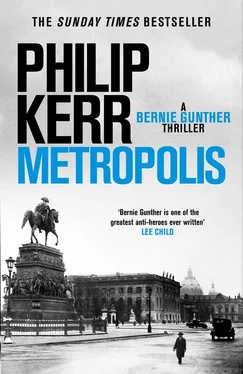I had become tired of Fischer’s constant baiting and the assumption that because I was a cop I was also a Nazi lackey.
‘I think you’re entitled to know nothing,’ I said, pushing him back out of the doorway. ‘Although it does seem to me that nothing is usually what a Bolshevik heel hound such as yourself knows best of all.’
‘Listen, I’m a citizen. You should be more polite. Or I’ll feel obliged to report you to your superiors.’
‘Go right ahead. Meanwhile, I think I’m all through being polite with you, Herr Fischer, so please don’t be in any doubt about that.’
I closed the door on him, leaving me alone with Frau Weitendorf, whose smile told me she’d quite enjoyed the way I’d spoken to Herr Fischer.
‘Lefty bastard,’ she muttered.
‘Mostly I don’t have anything against communists,’ I said. ‘But I’m beginning to make an exception in that man’s case.’
Rankin’s rooms were much like my own, though bigger and better appointed, with the same sort of furniture except there were more pictures and a large Royal typewriter on the desk. The lip of the basin was spattered with blood and full of pinkish water. Among the shards of broken phonograph records on the floor were several empties that had once been filled with good Scotch; the ashtray beside the typewriter was full of English butts; and a handsome leather suitcase was still on top of the wardrobe. There were at least ten copies of his book, Pack Up Your Troubles , on the shelves, almost as if he’d tried to improve its sales by buying it himself. I went into the bedroom and inspected the narrow single bed. The pillow smelled strongly of Coty perfume, perhaps suggesting that Rosa Braun had a better acquaintance with Robert Rankin than I might have supposed.
I picked up one of the records and inspected the label; the vocalist was Bessie Smith.
‘Why does a man smash his records like this? It’s not normal.’
‘That all depends on whether you like Bessie Smith,’ I said. ‘Me, I can take her or leave her.’
‘I don’t mind telling you, Herr Gunther, I’m worried something’s happened to Herr Rankin.’ She stubbed her cigarette out in Rankin’s ashtray and folded her arms under her substantial bosom.
‘I can’t say I’m inclined to agree with you. Not yet. Not on the basis of what I’ve seen in here. He drinks a lot. More than he should, perhaps. He smashed a few records. People do things like that when they’re drunk. And he cut himself shaving. If it wasn’t for the absence of a stick of alum on the shaving stand I’d see no real reason to worry.’
Apart, I might have added, from the smell of Coty perfume on the missing man’s pillowcase.
I sat down at Rankin’s desk. There was a diary and, beside the big black Royal, a pile of typed pages I assumed were part of the book he’d been translating into German. I thought these might give me a clue as to what might have happened to him. ‘Why don’t you leave it with me for a few minutes? I’ll poke my muzzle through his desk drawers. See what I can find out.’
‘I don’t know,’ she said. ‘I should stay here and keep an eye on things. For Herr Rankin’s sake.’
‘True. You can’t trust anyone very much these days. And the cops not at all.’
‘I didn’t mean to suggest you would steal anything, Herr Gunther.’
‘That’s because you don’t know as many cops as I do.’ I thought of Commissar Körner and the way he or his men had helped themselves to what was in Eva Angerstein’s handbag. ‘Okay, take a seat. Here, have a smoke while you’re waiting.’
I fished out my packet of Salem Aleikum, lit one for each of us, and then tugged open the top drawer. The little Browning .25 caught my eye right away; I sniffed it carefully; it had been recently cleaned. Everything else looked harmless enough, even the dirty postcards featuring boys from the Cosy Corner, which was a queer bar not very far away. What with the cards and the drawings on the wall, I was beginning to wonder if the Coty perfume on his pillow hadn’t been worn by Rankin himself; of course that was just wishful thinking and I knew better. For one thing, there wasn’t a bottle of the stuff anywhere in his drawers, and for another, it wasn’t every queer who didn’t like women. Besides, Rankin was a very handsome man, with a bit of money, which made him almost irresistible to every woman in Berlin, including Rosa. I’d seen the way she looked at him, and the way he’d looked at her, and given his obvious predilection for boys and her habit of dressing as a man, they seemed to have a lot in common.
I looked in the diary and learned nothing, except that he often went for lunch at Höhn’s Oyster Saloon, and that he was a frequent visitor to the opera, which seemed like a questionable use of anyone’s time.
‘According to his diary he’s going to the Comic Opera on Friday night,’ I said. ‘So if he is dead he’s still got time to get his money back.’
‘Don’t joke about such things, Herr Gunther.’
‘No. Perhaps you’re right.’ I lifted the pile of typewritten paper and started to read. I must admit that I got slightly more than I had bargained for.
In April I rejoined the First Battalion of the Royal Welch Fusiliers on the Somme. We were billeted in Morlancourt, a very pretty village, and our trenches — formerly French, and hence more rat-infested than was normal — were at Fricourt, in close proximity to the Germans who were much inclined to throw all sorts of new bombs and grenades at us; the worst of these experimental weapons was one that we began to call the kitchen sink — a two-gallon drum full of explosive and every bit of scrap metal and frangible rubbish they could find to use in it as shrapnel. Once, we found an unexploded kitchen sink and discovered that as well as the usual nuts and bolts it also contained the complete skeleton of a chicken. If that sounds funny it wasn’t. Fragments of bone were every bit as dangerous as screws and rusted rifle parts, perhaps more so. I even saw a man who’d been struck in the head by a piece of his own officer’s jawbone after a mortar fell on the trench; it took him days to die of his injuries.
A few weeks later I was posted to the Second Battalion and was discovered to be unfit for trench service by the MO; this was something of a surprise to me since, apart from a cough, which turned out to be bronchitis, I felt reasonably all right. So I went back to Frise and took command of the headquarter company, where things were much more relaxed, or so I thought. Almost immediately something happened that persuaded me I would have been better off back in the trenches with the rats, facing down the Germans. I was obliged one day to borrow a horse and ride to the nearest field hospital with a case of trench foot that was to cost me all my toenails. I was lucky; for many men the only treatment was surgical debridement, and sometimes amputation. As soon as I had been treated, Brigade told me to take command of a firing squad, following the court-martial of a Welsh corporal who was charged with cowardice.
His case was already well known to me as it was to almost everyone in the Royal Welch; the day before throwing away his rifle in the presence of the enemy, the corporal had walked into no-man’s-land close to the German wire to retrieve his wounded sergeant, whom everyone had thought was dead but had now revived and was calling for help. In broad daylight the corporal had climbed over the parapet and, armed with only a white handkerchief that he waved in front of him like a flag of truce, walked slowly across no-man’s-land to where the wounded sergeant lay. At first the Germans fired shots around his feet to halt his advance, but he was not deterred and gradually their guns fell silent as they recognized the man’s enormous courage. Having reached the injured sergeant the corporal dressed the man’s wounds, gave him some rum, and then hoisted him up onto his back, carrying him all the way to his trench. Everyone who witnessed it said it was the bravest thing they’d ever seen and how it was a miracle that he hadn’t been shot for his trouble; even the Germans cheered him. The corporal might have been recommended for a medal but for the fact that there were no officers present to witness the action.
Читать дальше












